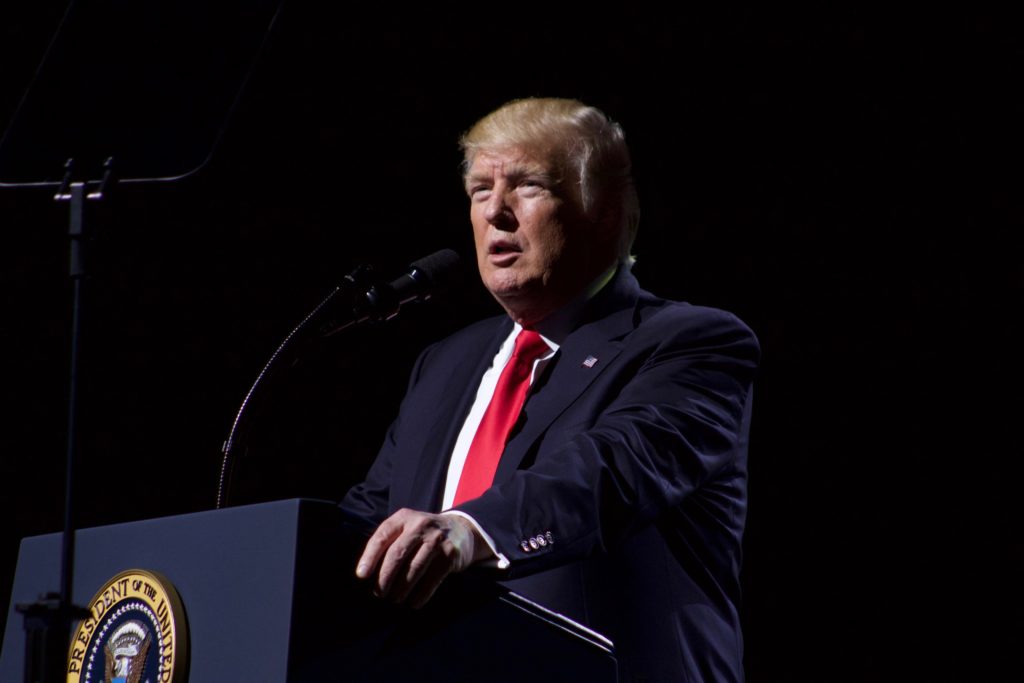
President Donald J. Trump speaks at the NRA Convention in Atlanta April 28./Julia Munslow, Editor-in-Chief
“Incompetent,” “despicable” and “immature narcissist” were some of the words Wilmington, N.C., voters used to describe President Donald J. Trump in an Emory-sponsored focus group Nov. 15.
The session, moderated by NBC and Wall Street Journal pollster Peter D. Hart, is the second focus group session of Emory’s “Conversations with America” series, which aims to “advance and promote conversation and civil discourse on the most pressing issues facing [the] nation,” according to a Nov. 13 press release.
Registered voters from Wilmington, including three Democrats, four Republicans and five independents, comprised the focus group. Seven voted for Democratic candidate Hillary Clinton and five voted for Trump in the 2016 presidential election.
Only Cynthia Layton, an independent who leans Republican and voted for Trump, described the president positively, reasoning that he “fights back.”
When Hart asked the group for three words to describe Trump’s first year in office, responses were critical, with six people mentioning the word “chaotic.” Others characterized Trump’s first year in office as a “failure,” “antagonistic” and a “nightmare.”
Annie Anthony, who voted for Trump and identified herself as a “not-so-strong Republican,” expressed disappointment with Trump’s presidency.
“My words [to describe his first year in office] were chaotic, stressful and an uphill battle,” Anthony said. “I thought his ideas appealed to me, but since he’s been in there he’s embarrassed me by his behavior.”
Melissa Hight, who also voted for Trump and identified herself as a “strong Republican,” said that her “high hopes” for the president were unfulfilled.
“[Trump] doesn’t facilitate working together. He comes out with these grandiose ideas and there’s no follow-through,” Hight said. “It’s a lot of talk and I just had such hopes that maybe things would be repaired, the whole country would be better off with him as president but he hasn’t acted very presidential at all.”
Four of five disagreed with the manner in which Trump speaks and conducts himself, saying that he has disappointed them with “diplomacy,” “tweeting” and “just basic decency.” The voters were especially disappointed with Trump’s behavior on Twitter, with four calling him a “bully.”
“I think every day he lowers the bar of what it means to be president with every tweet,” Democrat Terry Reilly said.
Independent Katrina Harrell echoed Reilly’s sentiments.
“He’s showing, to me, mental incompetence when he’s tweeting. And that’s the last thing we need to see from our president,” Harrell said. “If you’re going to be there, try your best to be professional.”
But Layton said that she was thankful for Twitter because it is a direct channel of communication.
“I like him because he talks like my neighbor talks to me. I don’t need an elitist person talking down to me,” Layton said. “The media does not give, I think, an honest opinion. That’s why I turned off cable 10 years ago. I read my sites, I listen to his tweets.”
Most people were disappointed in Trump’s handling of racial issues.
“I just think his rhetoric encourages hate,” Independent Sean Bynum said.
Others agreed with Bynum, pointing to Trump’s response to the deadly protests in Charlottesville, Va..
“I think he’s perpetuating and revealing the white supremacist mentality that a lot of elitists have in this country,” Harrell said.
After the Charlottesville incident, Trump said, “I think there’s blame on both sides.” Congressional Republicans and Democrats condemned Trump’s words.
According to Gallup, Trump’s job approval rating is 38 percent, with 57 percent disapproving, as of Nov. 19.
The focus group also discussed the opioid epidemic in the United States.
When asked to give a numerical rating on a scale of zero to 10, on how problematic opioids were in Wilmington, six rated the issue a 10, with the lowest rating being a seven. A 2016 Castlight Health report ranked Wilmington the No. 1 city in the U.S. for opioid abuse.
Some people recounted the deaths of friends and family as a result of opioid addiction. Independent James Rabon said that eight of his friends had died in the past six weeks due to heroin addictions.
Trump declared the opioid crisis a public health emergency in October, calling it the “worst drug crisis in American history.”
When asked to identify the two groups that they felt were most responsible for the opioid epidemic, nine participants pointed to pharmaceutical companies and doctors.
“It’s the money,” Independent Jacob Eubank said. “I don’t think they’re necessarily looking out for the good of the patient anymore because they’re getting all of these kickbacks from whatever their whatever prescription they’re putting them on.”
Others in the focus group agreed that the earnings of pharmaceutical companies have taken precedence over people’s lives.
Executive Editor | cyan24@emory.edu
Christina Yan (21B) is from Monmouth Junction, N.J., majoring in business administration. She previously served as assistant news editor and news editor. She won a 2018 Mark of Excellence Award from the Society of Professional Journalists in the General News Reporting category for her coverage of Emory Law Professor Paul J. Zwier II’s use of the N-word in class and also placed as a finalist in the same category for her investigation of the 2018 Student Government Association elections. Outside the Wheel, she is an academic fellow, QTM100 lab assistant and a member of Emory China Care's marketing team. In her spare time, she enjoys flexing on others with her ability to eat spicy food.



